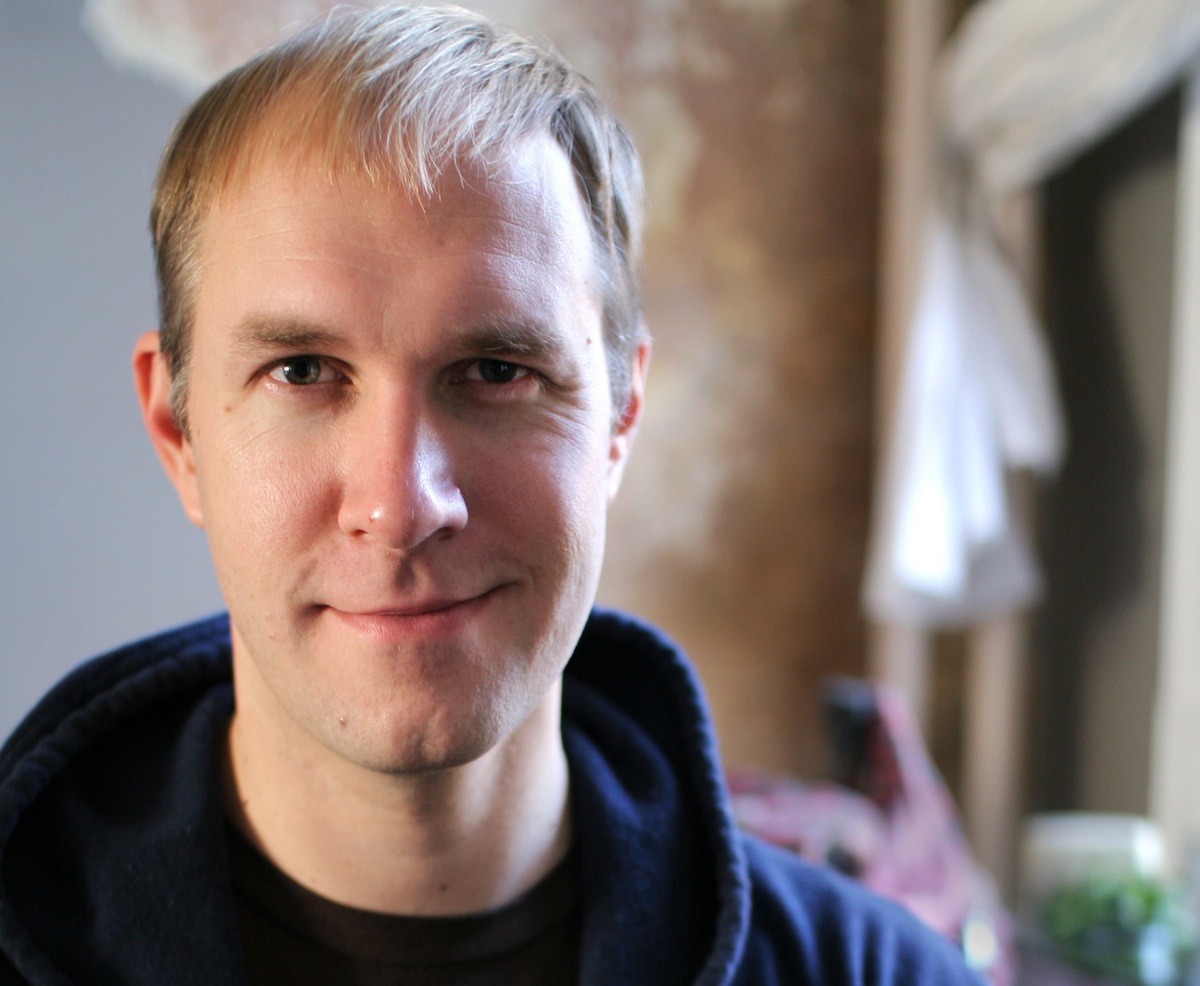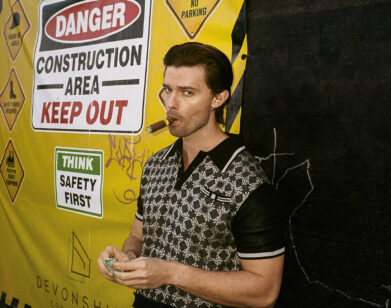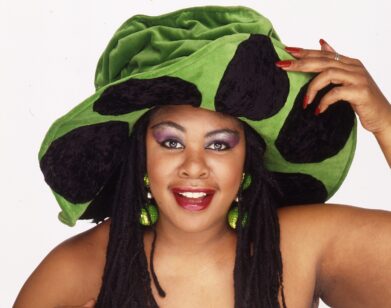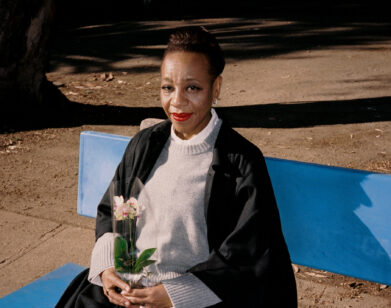Craig Zobel, Leading Authority

How far would you go to comply with an authority figure? This question lies at the heart of Compliance, director Craig Zobel’s parable about the often harrowing consequences of blind obedience. Based on a real-life incident at a Mount Washington, Kentucky McDonalds in 2004, the film follows Becky (Dreama Walker), a teenage counter girl at the local ChickWich, and Sandra (a sensational Ann Dowd), the restaurant’s middle-aged manager, throughout the course of a busy night’s work. When a man calling himself “Officer Daniels” phones in and accuses Becky of stealing from a customer, the responsibility falls on Sandra to detain and interrogate her until police can arrive.
Compliance hit the festival circuit earlier this year to divided reactions—best evidenced by the film’s now-infamous Sundance post-screening Q&A—with many claiming the film deliberately exploits its teenage protagonist and a great many others coming to Zobel’s defense. We caught up with the director nearly seven months after the initial fracas as he prepared to unveil his film to much larger (and hopefully more civil) audiences.
JEFF OLOIZIA: So you’re sitting in the theater at Sundance, the movie’s just ended, and people are kind of starting to get worked up. What’s going through your head?
CRAIG ZOBEL: It was interesting. I mean, I was walking down the aisle to go to the Q&A, and immediately this woman was screaming, basically, that it was offensive to women and that rape is not entertainment—to which I was like, “I agree!” People were already standing up and yelling at her back in the audience, and nobody was even at the microphone. So my first thought was, “Whoa. What did we make?” But then as I was walking down, I walked by this film producer who I vaguely knew and respected a lot, and he looked up at me and was like, “Craig, your movie’s amazing!” And I thought, “Okay, so that guy liked it.” [laughs]
OLOIZIA: When you’re about to step in the firing line, it’s probably pretty reassuring to have somebody tell you that they’re on your side.
ZOBEL: Yeah. [laughs] It did help to be like, “Okay, there’s going to be multiple reactions.”
OLOIZIA: Right. Did you feel personally attacked at all?
ZOBEL: No, not really. I felt more kind of, like, “Oh, did we miscalculate?” I guess I wasn’t fully prepared for the emotional response that the movie gives, and I feel like if you did not know what you were getting into with that kind of movie and had that sort of response . . . it’s not a black and white movie in any way. I mean, I like the idea that you would think about it the next day. That, to me, would be the measure of having done something cool.
OLOIZIA: I think it would be very interesting to speak with the audience a day after watching the movie.
ZOBEL: Or even like 20 minutes later.
OLOIZIA: Were you aware as you were making the film of just how explosive the content might be?
ZOBEL: I knew we were making some choices that would make some of the audience not go with us. I did know that we were doing that. But it’s funny—it also depends on who that first audience is and how that frames the conversation. I just showed it in Europe, and the conversation was completely all about American policy and what’s going on in America. Someone even asked me, “Was this political subtext the reason why the film had such a divisive reaction at Sundance?” I was like, “Not technically, no. That was not the first thing.”
OLOIZIA: I think, for me, knowing that the story is rooted in fact—and not just one, but a series of incidents—makes it seem not only far-fetched but sort of shockingly real as well. Why then do you think people still take such an issue with the film?
ZOBEL: People have pointedly said to me, “That may be true, but I still don’t believe it.”
OLOIZIA: Oh, that’s interesting.
ZOBEL: To which I’m like, “Okay, either you’re resistant to it or I did a bad job to convince you of its realism.” But I guess I don’t feel like I did a bad job to convince me. I feel the performance was still natural and that the right things happen in order to make these situations really go down.
OLOIZIA: Sure, I think that’s kind of the point. When I watched, I remember thinking with each decision that was made—at first it was like, “How can this be happening?” And then you sort of see step-by-step how –
ZOBEL: You’re like, “Oh, right. I guess that’s how.” [laughs]
OLOIZIA: Yeah, and it’s terrifying. But I think it rings true.
ZOBEL: I hope so. I would assume that everyone has an experience in their life where they knew something wasn’t cool, but even if they sort of removed themselves from it, they didn’t totally stop it and become a hero. [laughs]
OLOIZIA: I noticed in reading criticism of the film that there seems to be a lot of sort of presumption in terms of what you had intended the audience to feel while watching the movie. Or, at least, whether you meant to implicate us as viewers as sharing in responsibility for what ultimately happened.
ZOBEL: You know, it’s funny. For me, the movie was an experiment the same way the Milgram experiments were, which I had been reading about before [making the film]. Looking at it that way, my reaction has been like, “Wow, isn’t that a fascinating reaction in that’s where people are going with that. You could have actually read that a different way too, but you chose to decide that that’s what I was doing.” [laughs] So I’m a little hesitant to—it feels like I’ll break it if I try to say very specifically what my intent was. Or it will feel like I actually have more than a curiosity. Which is what it was.
OLOIZIA: And of course, everyone who acted in the film had read the script and knew what they were getting into.
ZOBEL: Yeah. It’s been funny. I’ve definitely gotten some critique of the movie that basically asked, “Did I torture the actors the same way [Dreama] is tormented in the film?” Like, “No, I did not!” We mostly were eating M&Ms between takes.
OLOIZIA: I thought you actually did a pretty graceful job in terms of pulling back where you needed to. Did you ever consider showing more?
ZOBEL: Yeah, kind of. Towards the end, without giving spoilers away, I kind of knew how I was going to shoot the whole time. But in the beginning of the film, I was a little more like, “I don’t know what the right decision is here.” That’s when it was great to have Dreama on set to talk to about it and be like, “Where is the line for you?”
OLOIZIA: It’s not exactly Hostel.
ZOBEL: Not at all. We would shoot something and show her playback and be like, “What do you think about that?” And so it was a pretty collaborative decision, honestly. For me, the line was: if you can’t defend it as being something that is about making the gravity of the situation notable or to help root and land the action, then it should be avoided.
OLOIZIA: Taking all this into account, what is the biggest compliment someone could pay the film?
ZOBEL: The biggest compliments I’ve gotten have been from people who’ve seen the film at festivals and have said, “You know, I fully connected with these people. The movie made me very uncomfortable because I totally can see how this or that situation happened.” They’re, for lack of a better term, picking up what I was putting down. [laughs] For me, it’s very empowering to feel like we made something interesting.
COMPLIANCE IS OUT IN LIMITED RELEASE THIS FRIDAY, AUGUST 17.






